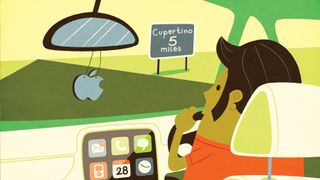Apple should value people over patents when it comes to life-saving tech
Won't somebody think of the Samsung users?

There is no getting away from it: using a phone while you are driving is dangerous. So it's good news that Apple has come up with tech to stop drivers using their phones at the wheel. Except for one thing: Apple has patented the technology. This is a system that could save lives, so why is Apple keeping it to itself?
The trouble is with weaning people off using their phones in-car is that phones are very handy as well as dangerous. Some smartphone features are even explicitly designed to be useful during a journey - the turn-by-turn navigation offered by Apple, Google and Bing maps have rendered standalone GPS systems all but obsolete. A case could even be made for live traffic alerts actually improving road safety.
It seems a shame to lose those advantages by stuffing your phone into the glove box but what can be done?
Filed by Apple and granted last week, US Patent number 8,706,143 describes a "Driver handheld computing device lock-out" - in other words, a method for preventing the use of a smartphone or similar device while behind the wheel of a motor vehicle.
In it, Apple suggests two potential methods for locking down phones. One requires modfication to the vehicle and could end up being implemented as part of Apple's CarPlay dashboard integration. The other just uses the phone's sensors very cleverly to ascertain that you are driving and lock you out of certain functions.
Drive time
"The idea of Darwinian selection favouring those who buy Apple products no doubt appeals to Tim Cook"
This isn't a case of a company inventing a problem that it can magically solve with new technology. It is an offence in the UK and most US states to use a handheld smartphone or similar device while in charge of a vehicle and a quick glance at the statistics will show you why.
Get daily insight, inspiration and deals in your inbox
Get the hottest deals available in your inbox plus news, reviews, opinion, analysis and more from the TechRadar team.
A US report by the National Safety Council found that phones were a factor in a quarter of all car accidents. Another study of commercial, heavy-goods drivers found that using a phone can increase the risk of an accident by 23 times.
A phone can be have a dramatic effect on your ability to concentrate. A 2012 study by the Institute of Advanced Motorists found that using a social networking app on a smartphone can reduce reaction times by 36.7%.
Texting while driving was almost as bad, with reactions slowed by 36.4%. This is an astonishing figure when you note that smoking cannabis only slows reactions by 21% and drink-driving at the legal limit typically dulls reactions by 12.5%.
Slower reflexes aren't the full story, either. Observational skills are also affected by using a phone, causing drivers to miss key events around their vehicle. Even staying in the central lane becomes difficult, with participants in the study finding that they would sometimes drift into other lanes slightly during the few seconds that they were distracted by a text or a tweet.
Caring and sharing
So, the problem is real and any attempt to solve it should be greeted warmly: what Apple is doing here, however, seems wrong. If the company really has found a way to keep the advantages of smartphone use in a vehicle while minimising the risk of drivers becoming distracted then that is a great thing, and it should be shared.
But while the idea of Darwinian selection favouring those who buy Apple products no doubt appeals to Tim Cook, this is one issue that needs cross-industry support. If ever there was a case for Apple to put profits to one side and for the whole industry to work together, a lifesaving opportunity like this is it.
If big players like Samsung, Nokia, Motorola and HTC could join with Apple to make this technology a standard rather than a nice-to-have. One impulse of altruism from Apple would mean safer roads for all of us, and that's why this patent is a wrong turn.
Most Popular
